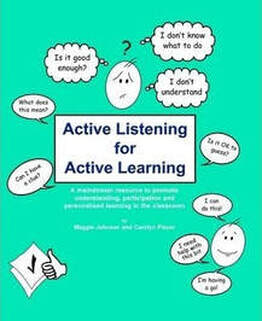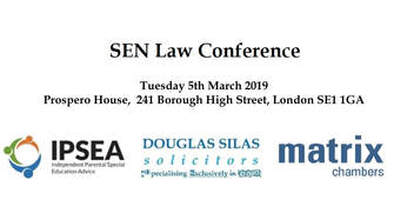|
We are now moving towards the end of the chronological year 2018 (don't worry, the academic year 2018/19 lasts until July 2019!) So you will not hear from me now again until my Spring SEN Update in January 2019. In this SEN Update, you will find sections entitled:
As I always say, I know how busy everyone is, so please feel free to read just the sections that are of interest to you or read everything; the choice is always yours. Don’t forget, to ensure that you never miss out on one, you can get my SEN updates personally by completing your email details below, by using our App ‘SEN.fyi’, or by following me on one of the Social Media platforms that I use, at the top of this page. You can also easily share this update with others (please only do so if it may be relevant to them) by using one of the icons usually to the right or at the bottom of this page, or on our 'SEN.fyi' App (by using the ‘share’ feature at the bottom of the page). THIS AFFECTS US ALL (SEN FUNDING) There has been a lot of talk recently in the press about SEN Funding difficulties, including mentions of some Local Authorities (LAs) being on the verge of bankruptcy. The word ‘crisis’ has been used a lot and there has also been talk about lack of SEN funding affecting schools. I am aware also of recent legal actions brought against LA SEN budget cuts. The article that caught my eye was one entitled: “Special needs pupils being failed by system 'on verge of crisis' (rising demand puts councils in England at risk of bankruptcy, Guardian investigation reveals)” that stated: ‘Parents of children with SEND are increasingly locked in prolonged and costly disputes with councils across England who are too often failing to deliver on their legal obligations. As a result, many of the most vulnerable children in society end up without the support to which they are entitled, and are out of school for months – even years – as parents battle to secure the right provision to meet their child’s needs.’ Unfortunately, I see this happening all the time (and I am sure that many of you do too); but we must recognise the extensive and increasing duties for LAs/Schools, who are also dealing with significant funding cuts. There just seems not to be enough money to go around sometimes. This is something that affects us all. At the same time, I have seen articles about disabled people not getting services they require. One article said that one in five disabled people are having their rights violated and feel excluded from society in a ‘damning’ report by the Equality and Human Rights Commission, presented to the United Nations. It stated: ‘“more and more disabled people are finding it difficult to live independently and be included, and participate, in their communities on an equal basis.”’ I have tried to look at these problems objectively and see if there may be a solution to this problem. There is no point in me talking about increasing efficiencies - I know that there is only so much you can do to remove slack in any system and we all (particularly LAs and schools) have been tightening our belts again and again these past few years. It seems to me though that the problem may be one of forward-planning and self-fulfilling prophecies (some may call it a ‘vicious circle’). Let me explain... If budgets are increasing because of more ‘dependent’ disabled people reliant on social care funding from LAs, then the trick may be to try and teach children/young people with SEN to be more ‘independent’ earlier; and thereby reduce their reliance on the state later in life. ‘Front-loading’ the system in this way, if possible, may help in the long run to reduce financial burdens on both LAs and the Government in future years. In fact, this could also help some people into work who then pay taxes, who would not be able to otherwise. So then, rather than taking ‘out’ of the system, they will be putting ‘into’ it. This seems like a win-win to me. Remember, the old adage goes: “a little pain now, saves a lot of pain later’. I know this may seem simplistic, but although I was pleased to hear the recent budget say that austerity is at an end, I think we should all still be concerned about ongoing SEN funding crises and the impact and consequences of cuts during recent years. THIS MAY HELP MANY PEOPLE (‘ACTIVE LISTENING’) One advantage of doing what I do, is that I am asked to speak occasionally at conferences about SEN Law. The advantage is that I usually get to stay before or after my slot to hear other speakers talk. Recently, I was asked to speak at a conference hosted by the ‘CEN SpLD’ group established through the Royal College of Speech and Language Therapists (CEN SpLD stands for ‘Clinical Excellence Network for Specific Learning Difficulties’). One of my fellow speakers was a very experienced speech and language therapist called Maggie Johnson. Her talk was entitled: ‘Active Listening for Active Learning’ and, as I was very taken by some of the things she said, I would like to share them here with you, as I think that this may help many people. Although the talk was focusing on working with children/young people with Specific Learning Difficulties, or other children/young people with Speech and Language difficulties, I think it will be of benefit also to children/young people with SEN and, dare I suggest, even to lots of us personally, as well as professionally! Maggie firstly introduced the concept of ‘Active Listening’ by describing it as a two-way process involving listening, decision-making and participation. She said that it means recognising when you have not heard something properly (or do not understand something properly) and then seeking to put it right - she called this: ‘Conversational Repair’. Maggie pointed out how curriculums are usually verbally mediated and can therefore be sometimes hard to understand for children/young people with SpLD/Speech and Language difficulties/other types of SEN. She then asked us how we would cope in a situation, where we did not understand something said to us. She also pointed out that, whilst we sometimes think that a child/young person does not understand something because they are not paying attention, it may actually be that they are not paying attention because they do not understand something! Maggie said that this was specifically a problem for children/young people she worked with and spoke about the importance of empowering children/young people with difficulties, to ask for clarification if they did not understand something. Turning to the speaker, standing close to them and being aware that messages cannot always be understood, may also help us identify reasons for non-comprehension, or breakdowns in communication and help us address problems. Maggie put across her subject very well, including playing videos of children she had worked with, where she had deliberately confused or withheld instructions, so that we could see for ourselves their responses, both before and after ‘Active Listening’ input. This really helped me understand things better. Very simplistic you may think again, but this makes so much logical sense when you reflect on it, doesn’t it? Think about it - how can you pay attention to something if you do not understand it? We have all been in situations like this, where we have ‘switched off’ if we do not understand something. Why do we expect a child/young person with SpLD/SEN to be any different? It would take me far too long to detail here everything else that Maggie said, but if this is something of interest to you, there is her book called: ‘Active Listening For Active Learning’ which you can find here. PLEASE BOOK EARLY THIS YEAR (SEN LAW CONFERENCE) As many people know, together with the IPSEA and Matrix, I helped put on the first new annual SEN Law Conference at the Law Society in Central London last March 2018. You may recall that it was a specialist conference that provided legal and policy updates on all aspects of this fast-moving developing area of law and was aimed at professionals working with:
Speakers included representatives from the Department of Education, a Local Authority, the Local Government & Social Care Ombudsman, the SEND Tribunal etc., as well as IPSEA and Matrix. As this was a new annual SEN Law Conference for us, we were not sure how many people would want to attend, but we found that all the tickets had been sold for the 225 places, well before the conference itself was held in March 2018, so some people found that they could not attend and were disappointed. The SEN Law Conference is this year being held on Tuesday 5 March 2019, again in Central London. Although not all details are yet finalised, there will this year again be a great line up of speakers and SEND topics that will be covered. Bearing in mind that we were booked up early last year and also listening to feedback we received, we have moved the conference to a larger venue this year at Prospero House, which has more space, better facilities and can accommodate more people. We are also launching the conference earlier this year, to give people more time to book. May I therefore suggest that, if you want to come, you book a place as soon as possible, to avoid disappointment. It really is already a must-attend event for anyone concerned with SEN. You cannot yet book a place, but I will send out another email in the next week with more details about how you can do so at www.senlawconference.co.uk. (We are again offering an early bird discount). I am very excited about this conference again - as I said last year, I would attend it, even if I was not helping to organise it! FORTHCOMING SEN EVENTS This section is shorter than usual. Unfortunately, I cannot currently find any notable SEN events taking place until the end of this year that I can recommend to you, although I would point out the following again:
However, I saw in the latest copy of SEN Magazine that there seem to be a number of online courses about things like Autism, Dyslexia, Attachment And Trauma, Speech, Language And Communication, the SEND Code of Practice, etc. “I CAN’T GET UP!”
I returned a few days ago from doing another international bike ride on my specially-modified recumbent trike for the charity, Norwood, which helps children and young people with disabilities. I am glad to say that, together with friends, I managed to raise about another £21,500 for Norwood. This time (my 9th), the ride was in Greece and we cycled just under 500 kilometres in 5 days to/from the beautiful city of Thessaloniki (Salonica) and also completely around the very hilly island of Thassos! People ask me why I do so many rides for Norwood. One reason is that I like to do something that helps both me (in terms of keeping active and challenging my progressive disability) and that helps me also help other disabled people (in terms of raising money). But one of the other reasons I do these rides, is that Norwood (who were the original charity that started fundraising through bike rides) also takes people with disabilities who it helps, on them, riding on the back of tandems ridden by other strong cyclists. It is very special and eye-opening riding with disabled people who you know will benefit from your fundraising. When you do a ride like this, where you share challenges everyday with other like-minded people, you really feel that you are making a difference. They say that you are also joining the Norwood 'family'! As you may know from reading this section in my previous updates, these bike rides always seem to have funny things happening to me, as a disabled person using a wheelchair. I am also conscious that, whilst I often will reveal things to people, there is a lot I don’t tell sometimes - as I often hear from fellow riders: “What goes on tour, stays on tour…” As you may recall from my update at this time last year, I arrived on that bike ride to find that our airline had left my wheelchair back in England, so I had to spend the first few days without it (although I had one lent to me in the interim by the airport). This time, whilst I managed to get my wheelchair to Greece, unfortunately, the cushion that I sit on was left behind by accident in England. I therefore spent the week sitting about an inch or so lower in my wheelchair. An added difficulty was that my cushion is ‘Velcro-ed’ to the seat of my wheelchair, so I then also found that with my Lycra cycling ‘bottoms’ on, I would stick to the wheelchair when I was sitting on it, which made it hard for me to get up again from my wheelchair when I needed to transfer to my trike! My finding myself ‘Velcro-ed’ to my wheelchair was very amusing to everyone during the week and, after initially feel aggrieved by this, I also found myself eventually seeing the funny side of it. One of the people who I have ridden with during the past few years is a young man with Down’s Syndrome called Nick, who has a great sense of humour and positive attitude to life, but who also has a speech impediment. So it was even funnier when I found myself one day towards the end of the ride, experiencing real difficulty getting up from my wheelchair when Nick looked at me and said: “Goes tour, stays tour!” With good wishes Douglas P.S. I always find it helpful to find out what people think about my updates, so please take a few seconds to tell me what you think by
There are just 3 quick questions. Comments are closed.
|
Archive
March 2022
|
© Douglas Silas Solicitors 2005-24
Authorised and Regulated by the Solicitors Regulation Authority (SRA no: 643718)
‘Douglas Silas Solicitors’ is the trading name of ‘Douglas Silas Solicitors Limited’, a limited company registered in England & Wales (company no: 10689991), whose registered office is Gable House, 239 Regents Park Road, Finchley, London, United Kingdom, N3 3LF. A list of members/directors may be inspected at our office.
Authorised and Regulated by the Solicitors Regulation Authority (SRA no: 643718)
‘Douglas Silas Solicitors’ is the trading name of ‘Douglas Silas Solicitors Limited’, a limited company registered in England & Wales (company no: 10689991), whose registered office is Gable House, 239 Regents Park Road, Finchley, London, United Kingdom, N3 3LF. A list of members/directors may be inspected at our office.






 RSS Feed
RSS Feed







